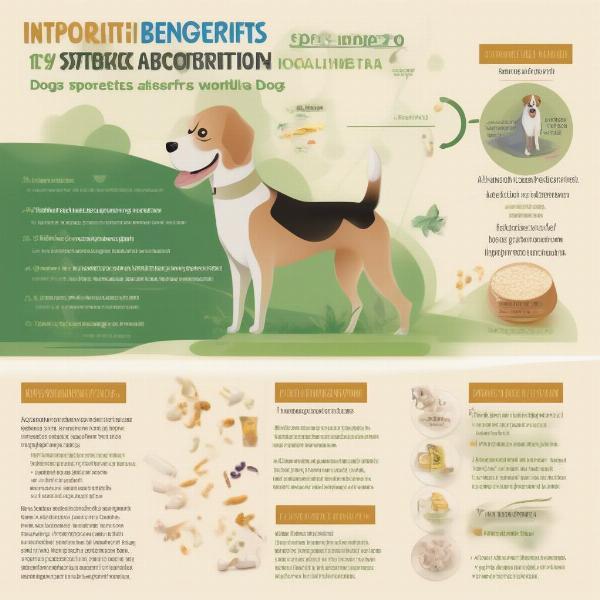Synbiotics for dogs are becoming increasingly popular as a way to support digestive health and overall well-being. They combine the benefits of both prebiotics and probiotics, offering a synergistic approach to nurturing your dog’s gut microbiome. But what exactly are synbiotics, and how can they benefit your furry friend? This guide will explore the world of synbiotics for dogs, covering everything from their benefits and usage to potential side effects and choosing the right product.
Understanding Synbiotics for Dogs
Synbiotics are a combination of prebiotics and probiotics that work together to improve gut health. Prebiotics act as “food” for the beneficial bacteria (probiotics) already present in the gut, promoting their growth and activity. Probiotics, on the other hand, are live microorganisms that, when administered in adequate amounts, confer a health benefit on the host. This synergistic relationship creates a powerful tool for supporting a healthy and balanced gut microbiome in dogs.
What are the Benefits of Synbiotics?
Synbiotics can offer a range of benefits for dogs, including:
- Improved digestion: By promoting the growth of beneficial bacteria, synbiotics can aid in breaking down food and absorbing nutrients, leading to better digestion and less digestive upset.
- Enhanced immune function: A healthy gut plays a crucial role in immune health. Synbiotics can help strengthen the gut barrier, preventing harmful pathogens from entering the bloodstream.
- Reduced inflammation: Synbiotics can help reduce inflammation in the gut, which can be beneficial for dogs with inflammatory bowel disease (IBD) or other digestive issues.
- Better nutrient absorption: A healthy gut microbiome aids in nutrient absorption, ensuring your dog gets the most out of their food.
- Reduced allergies: Some studies suggest that synbiotics may help reduce the severity of allergic reactions in dogs.
 Synbiotic Benefits for Dogs
Synbiotic Benefits for Dogs
How to Use Synbiotics for Dogs
Synbiotics are available in various forms, including powders, chews, and capsules. The best way to administer synbiotics will depend on your dog’s individual preferences and the specific product you choose. Always follow the manufacturer’s instructions for dosage and administration.
Choosing the Right Synbiotic
When choosing a synbiotic for your dog, it’s essential to consider factors like:
- The specific strains of probiotics included: Different strains offer different benefits, so choose a product that targets your dog’s specific needs.
- The type of prebiotic: Look for prebiotics that are known to be effective in supporting the growth of beneficial bacteria in dogs.
- The quality of the product: Choose a reputable brand that uses high-quality ingredients and manufacturing processes.
Potential Side Effects of Synbiotics for Dogs
While synbiotics are generally safe for dogs, some may experience mild side effects, such as:
- Gas
- Bloating
- Loose stools
These side effects are usually temporary and resolve on their own. If your dog experiences any severe or persistent side effects, discontinue use and consult your veterinarian.
When to Consult Your Veterinarian
It’s always best to consult your veterinarian before giving your dog any new supplement, including synbiotics. They can help you determine if a synbiotic is appropriate for your dog’s individual needs and health status. They can also advise on the proper dosage and any potential interactions with other medications your dog may be taking.
Conclusion
Synbiotics can be a valuable tool for supporting your dog’s gut health and overall well-being. By providing a combination of prebiotics and probiotics, synbiotics offer a synergistic approach to nurturing a healthy gut microbiome. When choosing a synbiotic for your dog, always consult your veterinarian and select a high-quality product from a reputable brand. With the right synbiotic, you can help your furry friend enjoy a happier, healthier life.
FAQ
- What’s the difference between prebiotics and probiotics? Prebiotics are non-digestible food ingredients that promote the growth of beneficial bacteria in the gut. Probiotics are live microorganisms that, when administered in adequate amounts, confer a health benefit on the host.
- Can I give my dog human synbiotics? No, it’s essential to use synbiotics specifically formulated for dogs. Human synbiotics may contain ingredients that are harmful to dogs.
- How long does it take to see results from using synbiotics? It can take several weeks to see noticeable results from using synbiotics.
- Are there any risks associated with using synbiotics for dogs? While synbiotics are generally safe, some dogs may experience mild side effects like gas or bloating.
- Can puppies take synbiotics? Consult your veterinarian before giving synbiotics to a puppy.
- How do I store synbiotics? Store synbiotics according to the manufacturer’s instructions, which typically recommend a cool, dry place.
- What if my dog doesn’t like the taste of the synbiotic? Try mixing the synbiotic with your dog’s food or offering it as a treat.
ILM Dog is a leading online resource for dog owners worldwide, dedicated to providing expert advice on all aspects of dog care, from breed selection and health to training, nutrition, grooming, and product recommendations. We offer practical, trustworthy information to help you provide the best possible care for your canine companion. If you have any questions or need further guidance on choosing the right synbiotic for your dog, don’t hesitate to contact our team of experts at [email protected] or call us at +44 20-3965-8624. Visit ILM Dog for more information on dog health and well-being.